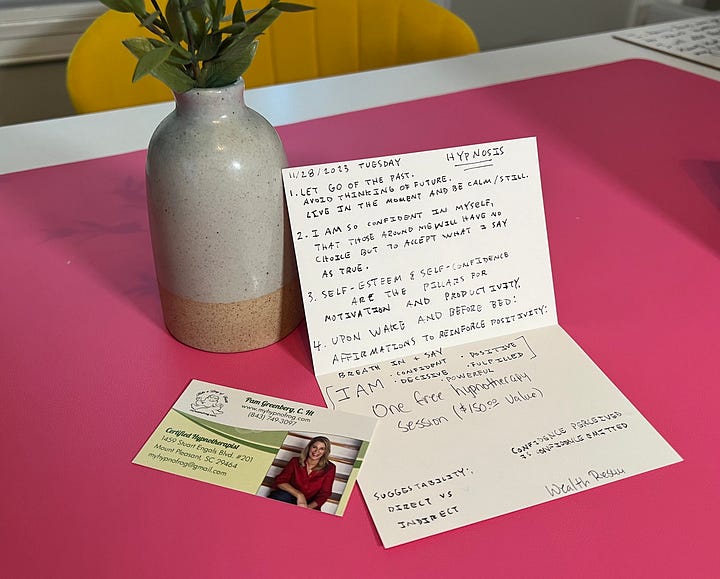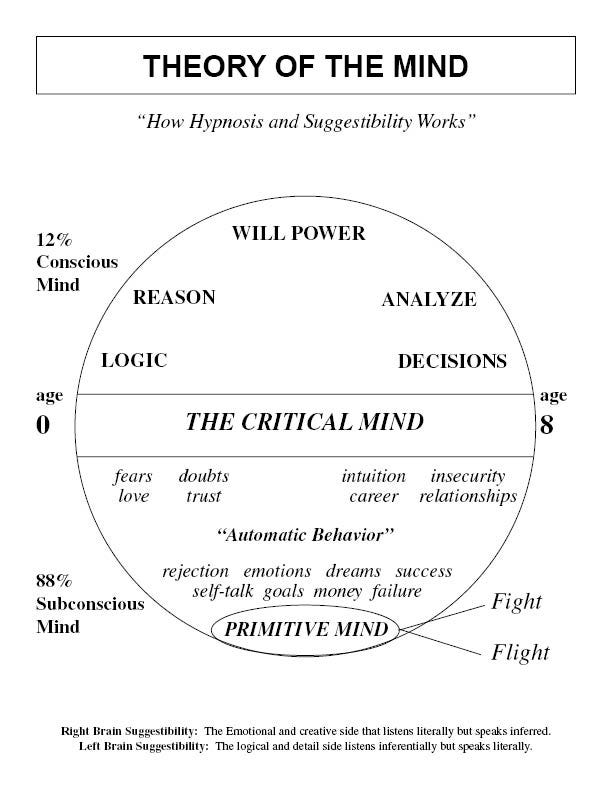The Subconscious Mind
Paul and I attended a wealth-building seminar in 2023 where we met a certified hypnotherapist and life coach named Pam Greenberg. Her office is located in Mt Pleasant, South Carolina, and she specializes in hypnotism for weight loss, smoking cessation, sports performance, immune diseases and cancer, and the Emotional Freedom Technique (EFT).
I was fascinated as she described the power of suggestion and how we can reframe our daily lives by targeting the subconscious mind. 🧠 She used the image below to describe how we develop our subconscious beliefs as a child, when we are most suggestible. During this time, we start to learn our fears, our likes and dislikes, and what we’re capable of. We aren’t thinking for ourselves much at this time. We are simply taking in information and creating automatic behaviors based on our experiences.
Experts say that from ages 7 to 9, we start thinking for ourselves, begin to seek understanding, and question incoming information. During this time, we develop what’s called the “critical mind”, which acts a a brick wall that blocks new information from getting into our subconscious mind. In addition, we start to develop the conscious mind, which we use for decision making, reasoning, analyzing, and logic.
Since the subconscious mind takes up about 88% of our “thought power” and only 12% for our conscious mind, our subconscious has a much greater influence on our behavior. As the critical mind blocks suggestions from entering the subconscious, it’s incredibly difficult to alter your default behaviors, and you continue to make decisions based on the stronghold of your subconscious beliefs.
Therefore, if you can accept new ideas into your subconscious, you can alter your default behaviors. The idea is that hypnosis puts you in a suggestible state, and in this state you can target and reframe your subconscious beliefs. Hypnosis and affirmations can be a tool to this end.
I scheduled a session with Pam, and one of my biggest takeaways was to perform daily affirmations. I hadn’t practiced much positive self-talk in the past, so Paul and I took action based on my notes from the session. During that session, Pam asked me what I wanted to feel more of, so we built affirmations around my response.


Self-Affirmation: the act of confirming one's own worthiness and value as an individual for beneficial effect (such as increasing one's confidence or raising self-esteem)
Four Tips to Master Affirmations
Paul would wake me every morning, sweep me off my feet, and carry me into the dining room where I had a giant sticky note on the wall that read, “I, Harris Jones, am STRONG, CONFIDENT, DECISIVE, POSITIVE, and POWERFUL!” I would read this aloud to Paul every morning in a loud, firm tone multiple times. We did this for weeks, and while it felt good to instill a habit of positive self-talk, it didn’t feel authentic. I wanted to FEEL it, not just SPEAK it.
So (as one does) I dove deep into the science of affirmations. I wanted to understand how to make them more effective. The articles I read and people we talked to revealed some interesting and surprising data, so I compiled them into a list for you (we love lists!) 😉
Breathe 🧘♀️
The saying “sleep on it” has value. When you breathe deeply, your body goes into a more relaxed, open, receptive state referred to as theta state, in which theta brainwaves are present. Theta waves are associated with the hypnotic or subconscious state between wakefulness and sleep.
When going to sleep, practice breathwork to put yourself into theta state. As you breathe in, repeat your positive affirmations in your head. As you breathe out, release any negative thoughts you have stored for that day.
Do the same practice as you wake up, but repeat your affirmations out loud (if your environment allows). In doing this, you are putting yourself in a suggestible state while physically “inhaling”positive thoughts and “exhaling” negative ones.
Process 👂
Affirmations can be more effective if you process them through your senses. You might be familiar with the advice to visually see yourself perform mirror affirmations, which also helps cultivate self-compassion and heal your inner critic.
Hearing your affirmations repeated back to you is also effective. Say them out loud, have a loved one repeat them back to you, or record yourself doing them and play it back for maximum effect.
Score 💯
Affirmations can have adverse effects if they create cognitive dissonance. Research published in the Journal of Psychological Science concluded that “repeating positive self-statements may benefit certain people, such as individuals with high self-esteem, but backfire for the very people who need them the most.” If you don’t somewhat believe your affirmations, they can create contradictory thoughts that do more harm than good.
To prevent inner conflict and cognitive dissonance, write your affirmations down on paper. Score each statement on a scale from 0 to 100 (where zero means you disagree with the statement completely and 100 means you believe it fully). For any affirmations scored under 50, rewrite them or discard them entirely. This will ensure that your positive affirmations are within reason, and over time their believability will increase. Practice the affirmations that scored 50 to 90.
Practice 💪
Positive self-talk requires practice! Perform your affirmations in the same way you would build a habit. Eventually, you will begin to identify as a person with high self-worth because you have persistently practiced the skill of positive self-talk.
If you do the work, you’ll discover that there are many things you already love about yourself in the areas that you value most.
Resources:
Pam Greenberg, C.Ht: https://www.myhypnofrog.com/
Breathwork and Brainwaves: https://breathmastery.com/breathwork-and-brainwaves/
The Washington Post: https://www.washingtonpost.com/wellness/2022/05/02/do-self-affirmations-work/
Journal of Psychological Science: https://journals.sagepub.com/doi/10.1111/j.1467-9280.2009.02370.x
Atomic Habits by James Clear: https://jamesclear.com/atomic-habits










